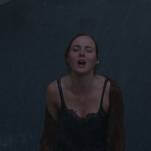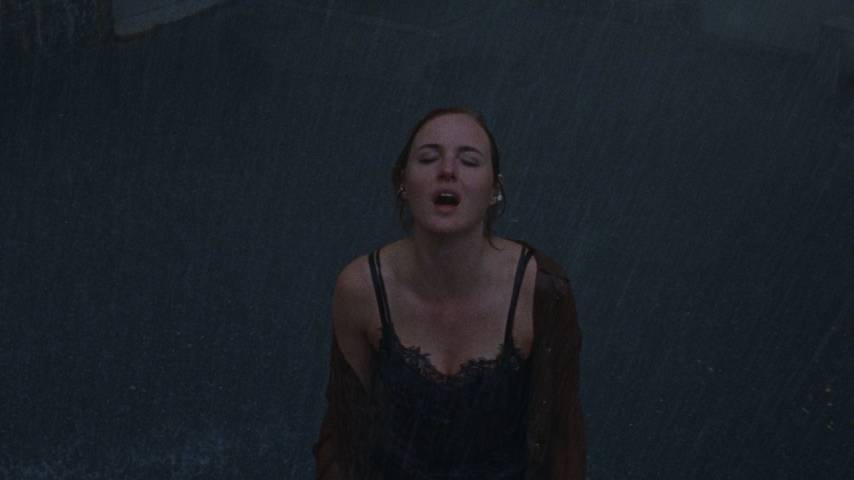A shocking allegation drives a parent-teacher conference into messy madness in Armand
Armand, which received the 2024 Caméra d'Or at Cannes, is a thrilling examination of parental folly that gradually loses focus.


A parent-teacher conference descends into a liminal hellscape in Armand, the feature debut of Norwegian writer-director Halfdan Ullmann Tøndel. Winner of the Caméra d'Or—which honors the work of a first-time feature filmmaker—at last year’s Cannes Film Festival, the film is replete with striking visual flourishes, yet its storyline suffers from the inclusion of an unnecessary air of surrealism.
Renate Reinsve (The Worst Person In The World) plays Elizabeth, a former actress and single mother who’s summoned to an emergency school meeting regarding her six-year-old son, Armand. She arrives well before the scheduled appointment, only to find junior teacher Sunna (Thea Lambrechts Vaulen) anxiously awaiting. While Elizabeth demands to know the urgent reason for her summoning, Sunna insists that nothing can be shared until everyone has arrived. To Elizabeth’s surprise, her sister-in-law Sarah (Ellen Dorrit Petersen) and her husband Anders (Endre Hellestveit) appear shortly after. They’ve come to discuss a disturbing altercation between Armand and their son, Jon, and wish to see some semblance of atonement on behalf of the school and, perhaps more importantly, Elizabeth.
As the allegations are shockingly sexual in nature, Elizabeth is incredulous from the offset. When purported quotes from Armand are shared—which involve decidedly adult words like “anal” and “fuck”—she cements her position as a mother unilaterally defending her son. In truth, components of Sarah and Anders’ testimony by way of Jon don’t quite add up. If, for example, Jon had truly begun to feel outwardly uncomfortable in Elizabeth and Armand’s company, then why would his parents continue to regularly leave him in their home? Elizabeth convincingly pokes holes in their argument, but suspicions about her own thespian background begin pointing to her own capacity for a performative display of innocence.
Armand is most successful when it maintains focus on the tense congregation of parents and officials, the latter being put in the awkward position of holding all perspectives equal while also enforcing a punishment for the party eventually found at fault. For some reason, though, Tøndel punctuates the lengthy assembly—held over the course of one afternoon just before the summer holiday—with unnecessary breaks for individuals to wander the cavernous school halls and whisper disparaging anecdotes about each other.
While intended to draw out the escalating tension surrounding the reported incident, these pauses curtail audience investment by adding petty intricacies to the sensationalistic center of the narrative. Revelations surrounding the death of Armand’s father, Elizabeth and Sarah’s once-close relationship, and Anders’ barely concealed attraction to his sister-in-law don’t add nuance as much as they clutter the film’s central investigation surrounding the power of scandal and the societal appetite for retribution.
Even less effective is Armand’s gradual incorporation of surreal, performance art-adjacent physicality. As the meeting grows intensely hostile and punitive, and the film draws to a close, Elizabeth and present company can no longer operate under the guise of civility. Resultantly, a modern dance conveying obsession and control breaks out in the barren corridors of the school, complete with other parents who’ve been crudely gossiping about the sexual violence that may or may not have occurred in their children’s proximity. The choreographed sequence doesn’t add much by way of plot, which already overtly critiques the desire for drastic reprisal even in the most muddled and unsubstantiated of cases.
This is tackled with incredible precision by Reinsve, who for five entire minutes during the tail-end of the conference is overcome with a hysterical laughing fit. Drool drips out of her mouth’s corners, she can’t catch her breath, her capacity for speech is totally compromised. This extended outburst should have allowed Tøndel to hammer home the absurdity of the circumstances; the inclusion of a writhing pile of bodies, all clawing at Elizabeth with rage and jealousy, is pure overkill.
Armand possesses the potential to be a lean survey of our cultural obsession with penalty. Cinematographer Pål Ulvik Rokseth captures the details of the school—burgundy bathroom tiles, winding staircases, echoing cloisters—with a dreary accuracy, conveying the already carceral aura of imposing educational structures. Yet the overwrought examination of parental-educator palaver detracts from the film’s more clever qualities, the most impressive being that the children whose fate they discuss never once appear.
For a project titled after the accused perpetrator of youth-on-youth perversion, refusing to have a child stand in for that image of deviance is intriguing: Would the viewer rather envision a potentially maladjusted child, or should they be solely confronted with the parental folly that produces these scandals, whether they’re rooted in reality or overreaction? Either way, Tøndel’s film doesn’t home its focus well enough to present a truly compelling answer.
Director: Halfdan Ullmann Tøndel
Writer: Halfdan Ullmann Tøndel
Starring: Renate Reinsve, Ellen Dorrit Petersen, Thea Lambrechts Vaulen, Endre Hellestveit, Øystein Røger, Vera Veljovic
Release Date: February 7, 2025





































/https://tf-cmsv2-smithsonianmag-media.s3.amazonaws.com/filer_public/b9/66/b966cb9e-8fe2-4d1c-bd7a-ba59740291ae/smithmag-podcast-s03-ep02-auroras-article.jpg?#)








































